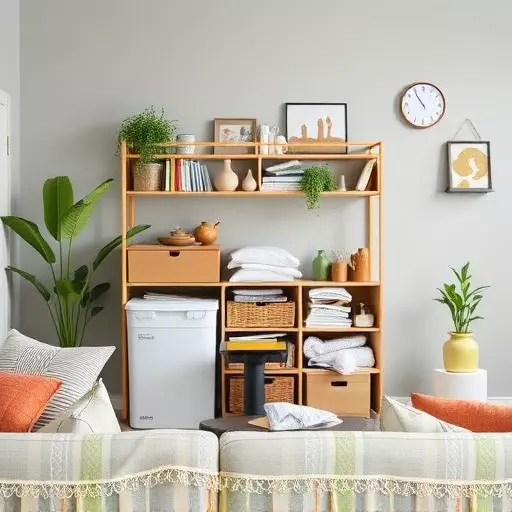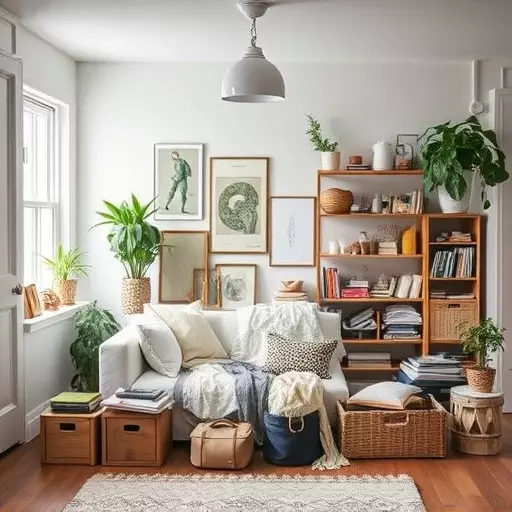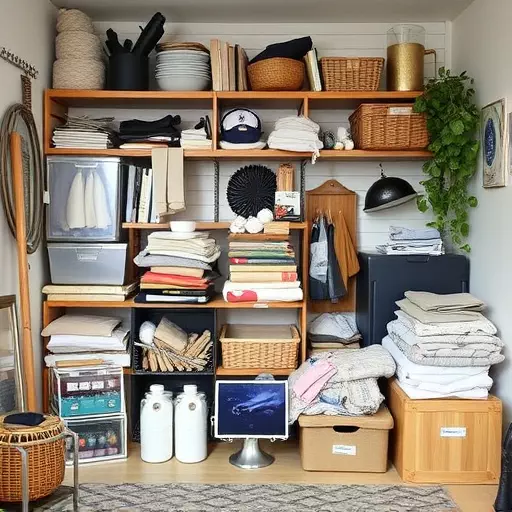Home organization and decluttering significantly impact mental well-being, reducing stress and improving clarity. Cluttered spaces contribute to cognitive overload, but letting go of unnecessary items creates a calm, ordered environment. This process fosters detachment from emotional baggage, enhances focus, and improves time management skills. Regular decluttering and practical storage solutions lead to a peaceful lifestyle, making daily routines more manageable. Minimalism as a strategy further reduces stress, boosting productivity and overall well-being. Consistent home organization is an investment in mental health, transforming spaces into relaxing sanctuaries for unwinding and focusing.
Organized homes are not just aesthetically pleasing; they significantly contribute to mental well-being. This article delves into the profound connection between home organization and stress reduction, exploring how clutter impacts our stress hormones and offering practical tips for a step-by-step declutter process. We’ll discuss the benefits of a minimalist approach, long-term strategies for maintaining order, and effective techniques to transform your living space into a serene sanctuary. Discover how achieving a calm home environment can enhance productivity and overall mental health through the power of home organization and decluttering.
- Understanding the Connection Between Home Organization and Mental Well-being
- The Impact of Clutter on Our Stress Hormones
- Benefits of a Decluttered Living Space
- Practical Tips for Organizing Your Home Step-by-Step
- Incorporating Minimalism to Reduce Stress and Increase Productivity
- Maintaining Order: Long-term Strategies for a Calm Home Environment
Understanding the Connection Between Home Organization and Mental Well-being

A tidy home is more than just an aesthetic pleasure; it’s a powerful tool for enhancing mental well-being. The connection between home organization and stress reduction is deeply rooted in our psychological response to our surroundings. Cluttered spaces can contribute to mental overload, making it difficult to find things, creating a visual chaos that the mind struggles to process. Conversely, organized environments promote clarity of thought and reduce cognitive load. Decluttering involves letting go of items no longer needed or used, which can significantly alleviate stress and create a more peaceful atmosphere.
This practice empowers individuals to reclaim control over their living spaces, fostering a sense of order and calm. Moreover, maintaining an organized home becomes a habit that extends into other areas of life, encouraging better time management and decision-making skills. As research suggests, the mental benefits of a decluttered space can lead to improved mood, increased productivity, and enhanced overall quality of life, making home organization a valuable strategy for promoting mental health and well-being.
The Impact of Clutter on Our Stress Hormones

Cluttered spaces can have a significant impact on our mental state, particularly when it comes to stress levels. Research suggests that living in a disorganized home environment triggers a response in our bodies, influencing our hormone production and contributing to increased stress. When surrounded by clutter, our brains are constantly processing visual information, which can lead to heightened stress hormones like cortisol.
Home organization and decluttering have been shown to mitigate these effects. A tidy space promotes a sense of calm, allowing for better mental clarity. By removing excess items and creating order, you reduce the mental burden of deciding where everything belongs. This simple act of organizing can lower stress, improve focus, and create a more soothing atmosphere in your living areas.
Benefits of a Decluttered Living Space

A decluttered living space offers more than just a visually appealing environment; it significantly contributes to reduced stress levels. When your home is organized, you create a sense of calm and control. This tranquility extends beyond aesthetics; it impacts your mental state, fostering a clearer mind and improved focus. The act of decluttering involves letting go of items that no longer serve you, whether they’re outdated belongings or possessions with sentimental value. This process can be therapeutic, allowing individuals to detach from the emotional baggage associated with certain objects.
Home organization and decluttering create a peaceful atmosphere where everything has its place, promoting an efficient and stress-free lifestyle. A well-organized home enables quick task completion, reduces time wasted searching for items, and minimizes overwhelm. This sense of order translates into a more relaxed and productive daily routine, making it easier to navigate life’s challenges with clarity and composure.
Practical Tips for Organizing Your Home Step-by-Step

Getting started with home organization and decluttering can seem daunting, but breaking it down into manageable steps makes the process less overwhelming. Begin by gathering all the items in a specific room or area, categorizing them into keep, donate/sell, or discard piles. This initial sorting is key to streamlining your space. Once sorted, prioritize organizing by keeping only what you truly need and use regularly. Consider each item’s purpose and where it belongs; assign designated storage spaces for like items to maintain order.
Next, implement practical storage solutions tailored to your needs. Utilize storage bins, baskets, or boxes to store smaller items, ensuring they are clearly labeled for easy access. For larger items, consider vertical space by installing shelves or utilizing under-bed storage containers. Regularly reviewing and maintaining this system is vital; seasonal changes can prompt reevaluating what you own and need in your home, keeping your living environment orderly and stress-free.
Incorporating Minimalism to Reduce Stress and Increase Productivity

Incorporating minimalism is a powerful strategy within home organization and decluttering that can significantly reduce stress levels and boost productivity. By adopting a more streamlined approach to living spaces, individuals can create an environment that promotes clarity of mind and focus. Minimalist practices encourage the removal of excess items, prioritizing only what is essential and bringing genuine value to daily life. This process involves thoughtful consideration and decision-making, fostering a sense of control and calm.
A tidy, organized home serves as a reflection of an individual’s mental state, making minimalism an effective stress reliever. It eliminates the overwhelming sensation of being buried under clutter, replacing it with a peaceful atmosphere that enhances productivity. Decluttering creates space not just in rooms but also in one’s mind, allowing for better organization of thoughts and tasks. This, in turn, leads to improved time management and a reduced sense of being overwhelmed, contributing to overall well-being.
Maintaining Order: Long-term Strategies for a Calm Home Environment

Maintaining a calm home environment requires more than occasional cleaning bursts; it’s about adopting long-term strategies for home organization and decluttering. This involves regularly setting aside time to organize spaces, storing items thoughtfully, and establishing systems that keep things in their place. Incorporating these practices not only enhances aesthetics but also fosters a sense of control and reduces the mental clutter that contributes to stress.
Over time, consistent effort pays dividends. A well-organized home becomes a sanctuary where residents can unwind, focus, and recharge. By decluttering regularly, one can prevent the accumulation of excess possessions, making it easier to maintain order and further minimize stress levels. This long-term commitment to home organization is an investment in mental wellbeing, creating a peaceful atmosphere that supports overall health and happiness.
Organized homes not only look neat but also significantly reduce stress levels, as evidenced by scientific studies on the impact of clutter on our mental well-being. By implementing practical tips for organizing your home and adopting minimalism, you can create a peaceful environment that boosts productivity and overall calmness. Incorporating long-term strategies to maintain order ensures a consistently serene living space, making home organization an essential practice for enhancing quality of life. Through effective decluttering and intentional design, transform your space into a sanctuary that nurtures mental health.


